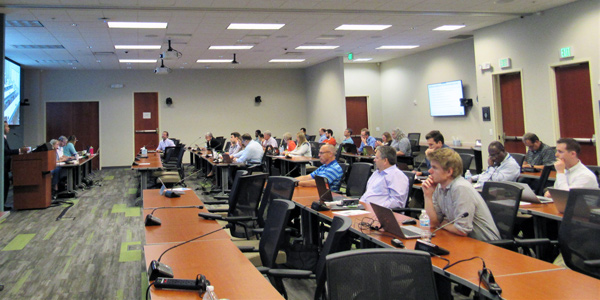CARMEL, Ind. — MISO is moving ahead with a plan to address delays in its interconnection queue by reducing the number of project studies and making generation owners more accountable for site control.
The RTO in May proposed to remove its transient-stability, short-circuit and affected-system studies from the first phase of the definitive planning phase (DPP) of the queue and require customers to demonstrate ownership, lease interest or land rights on a project’s site before entering the queue. (See MISO Proposal Aims to Speed Up Queue Process.)
MISO is now proposing to eliminate its proposed requirement that a developer have 100% site control upon entering the queue. A revised plan would instead increase the deposit due when entering the queue from $100,000 to anywhere between $500,000 and $2 million in cash, depending on the megawatt size of the project. The larger deposit would only become refundable if the proposed project makes it to the generator interconnection agreement step.
Under the plan, a project owner would have to demonstrate full site control by the second decision point of the interconnection queue, MISO Planning Manager Neil Shah said during a June 13 Planning Advisory Committee meeting. Any owner unable to provide proof of site control by then must forfeit the larger deposit and withdraw their interconnection application, he said, adding that MISO plans to hire consultants to validate site control demonstrations.
Stakeholders — particularly renewable developers — said the proposed site control requirements were still too high.
But Shah noted that in April alone, an additional 40 GW entered the interconnection queue, with around 75% of project owners electing to pay the current $100,000 refundable deposit instead of securing site control.
“The bar is too low for entering the queue,” Shah explained. “The intent is to raise the bar, so we have reasonably high requirements that do not harm ready projects because of the entry of the non-ready projects.”
Shah said MISO intends to file Tariff changes with FERC sometime in July.
5 Focus Areas in Market Congestion Planning Study
MISO has slimmed 116 new project ideas down to five areas of focus in this year’s footprint-wide market congestion planning study.
The Market Congestion Planning Study (MCPS) has so far identified four project candidates in four separate locations in MISO Midwest, and five projects to remedy one area of concern in MISO South.
In MISO South, five projects ranging from $8 million to $40 million with estimated benefit-cost ratios ranging from 1.10:1 to 3.27:1 are contenders to alleviate congestion on the 115-kV Natchez line at the Mississippi-Louisiana border.
In MISO Midwest, two projects focus on upgrading 138-kV facilities while two others are 161-kV solutions:
- A rebuild of the Wabaco-Rochester 161-kV line in southern Minnesota at an estimated $20.1 million, yielding a 3.62:1 benefit-cost ratio.
- A project to add a series reactor on the Forest Junction-Elkhart Lake 138-kV line in eastern Wisconsin for $2 million, resulting in a 3.7:1 benefit;
- A reconductor project on the Michigan City-Trail Creek-Bosserman and LNG-Maple 138-kV lines in northern Indiana for an estimated $8.5 million, with a 1.42:1 benefit.
- A new 161-kV line with a reconductor of an existing 161-kV line near the towns of Paradise and Wilson in southern Indiana for $33 million with a 1.59:1 benefit.
MISO Manager of Economic Studies Zheng Zhou said all cost estimates are planning-level estimates and are subject to change.
MISO’s MCPS study seeks to identify both near-term congestion-relieving transmission projects and long-term economic projects. Last year’s MCPS focused exclusively on MISO South and did not produce a single project recommendation.
Zhou said MISO will present final project recommendations from the MCPS at the September Planning Advisory Committee meeting.
— Amanda Durish Cook







